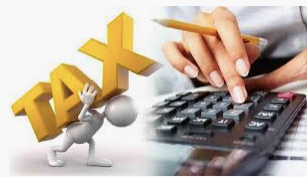We do Accounting for Artists, Freelancers and Creative Companies. Whether you're in NYC, LA - or anywhere in between, given our safe and easy online platform - check out our affordable prices and free accounting + tax advice.
Tuesday, January 25, 2022
Understanding a “CPA Letter for Verification of Self Employment”
Thursday, January 6, 2022
How Artists can Benefit from Doing Income Taxes with Online Accounting
Monday, December 20, 2021
A Brief Small Business Taxation Guide: What You Should Know
Choose your legal structure wisely
Use tax deductions to reduce your taxes
Pay taxes in three-month intervals
List of business taxes you might have to pay:
- Self-employment tax
- Excise tax
- Sales tax
- Payroll tax
- Property tax
Conclusion
Monday, December 6, 2021
What Happens If You Fail to Pay Your Taxes
If you
need more information on income taxes, consult with the Agro Accounting CPA
experts or hire our income tax services for the self-employed. Here,
let’s start with the possible outcomes of not paying your taxes on time:
Pay a Penalty
Fee
Are you
failing to file your taxes or failing to pay your taxes? There’s a huge
difference between the two.
If you
fail to file your taxes by the due date, there will be a penalty of 5%
of the tax owed for up to five months. If you take longer than 60 days
after the due date, then you will get hit with a minimum penalty of $210 or
100% of the tax owed, whichever is lower. For example, if the tax owed is $210
or less, the penalty will be the same as the total tax amount due. If the tax amount
exceeds $210, the penalty will be at least $210.
Warning
Letters from the IRS
Nobody
wants mail from the Internal Revenue Service. It's not like the IRS doesn't
give you a chance - it gives many. But before taking any strict legal action,
they send you a warning letter.
The best
thing to do after getting a letter is to reach out to the IRS office. The
authorities might look kindly on you as you admit your carelessness, unlike
those who have been lining their cat’s litter box with the IRS’ letters. You
may get a chance to negotiate a payment plan or even reduce the total tax
amount due.
Can’t
Apply for a Loan
If you
fail to pay your income taxes, you might get into a lot of trouble. You may not
be able to apply for a home loan, business loan, or vehicle loan. Banks or
lenders need to see copies of your most recent tax returns before giving you a
loan. Nobody gives a loan to someone who isn't consistent with filing or paying
their tax returns.
The IRS
Can Seize Your Property
In
Publication 594, the IRS has made it clear that the agency can sell your car or
property in order to clear out your outstanding tax in some scenarios. The
publication also states that if there is money left after the sale of your
property, you will get a refund of it.
To learn more about taxes or to obtain a tax preparation guide for artists and entrepreneurs, feel free to connect with Agro Accounting CPA.
Monday, November 22, 2021
How to Compare the Costs of Different Tax Preparation Options
1. Hiring an Accountant for Tax Preparation
2. Using Accounting Software
3. DIY Tax Preparation
Monday, October 25, 2021
Meeting Your Tax Preparer for the First Time? Here's All You Need to Know
Choosing the
best tax preparer is a challenging task. But once you have completed this
process, you will be headed in the right direction. Now, you must plan to meet
a tax preparation guide forfreelancers or the self-employed. Usually, people are a bit nervous
about their first meeting, and thousands of questions pass through their minds.
If you are going through the same phase, then keep reading to learn tips for
planning the first meeting with your tax preparer.
● Develop a healthy
relationship
If you are a starting freelancer or entrepreneur,
try to build a healthy relationship with your CPA. When you work with a person
for a longer period, things become smoother and professional relationships may
benefit your business. In addition, the experience of your tax preparer will
help you to face the various challenges of your business.
● Be honest
When you work with a tax preparation guide for entrepreneurs, you have to be honest. Trust
should be the basis of your professional relationship. Share all your records
and concerns with the CPA and, if there is any issue, try to find a solution together.
Remember, a tax advisor will not judge you, so be open with your problems.
● Keep essential documents
When going to meet a tax preparer for the first
time, you can ask them what documents they need. Some essential documents
include identification documents, income-related statements, expense-related
statements, and tax-deduction documents. If you don't have any of these documents,
don't worry: your tax preparer will assist you in dealing with this problem.
There is no
doubt that taxes are complex, but everything goes smoothly when you find the
right person to help you in tax preparation for entrepreneurs. Almost every person is stressed when
preparing taxes for the first time, but there is nothing to worry about. Trust
your tax preparer, cooperate, and don't panic!
Tuesday, October 5, 2021
How to Choose a Good CPA for Private Equity Accounting
Private equity accounting refers to the accounting operations that ensure the proper record-keeping and financial reporting of private equity firms. Firms, investors, and companies receiving financing must be in compliance with accounting standards issued by the Financial Accounting Standards Board (FASB) and the International Accounting Standards Board (IASB).
The role of a private equity accountant or income taxs services for small businesses is to ensure smooth accounting operations for all the parties concerned. If you are looking for a good private equity accountant, here are four things that you need to keep in mind:
- Specialization
The first thing you need to look for is the additional certifications of your accountant that show their specialization in private equity accounting and income tax services. A private equity accountant has expertise in investment fund accounting, corporate finance, and investment banking. An expert accountant with additional expertise helps facilitate dynamic decision-making in complex situations.
- Experience
Experience plays a key role when choosing a private equity accountant. Look for an accountant that has two to five years of experience in private equity accounting. An experienced accountant has gained practical knowledge by working with clients in different industries, which helps them easily manage their financial accounts and cope with the challenges that come with it.
- Client Base
Ask about the client base of your target private equity accountant. This will give you some idea about the reputation of the accountant. A good accountant has good clients and, above all, a good client retention rate.
- Reviews
Read the reviews and testimonials of your target accountant. This helps you get an idea of their reputation. You will find that a good accountant usually has positive reviews and good ratings. It is always a good idea to find references from people that you already know.
Simplifying Tax Season: Tax Preparation for Freelancers
Many people prefer working as freelancers or self-employed. Companies also prefer hiring freelancers because they don't have to handle p...

-
When you are a freelancer or small business owner, you might assemble people to help you in your work and, in this way, you lead your busin...
-
The year 2020 can be labeled as a year of major change for the market. There have been many significant changes introduced by the IRS for b...
-
Bookkeepers can benefit your business in many ways. They offer professional advice and insight into areas in which you lack experience. Ther...

















.png)